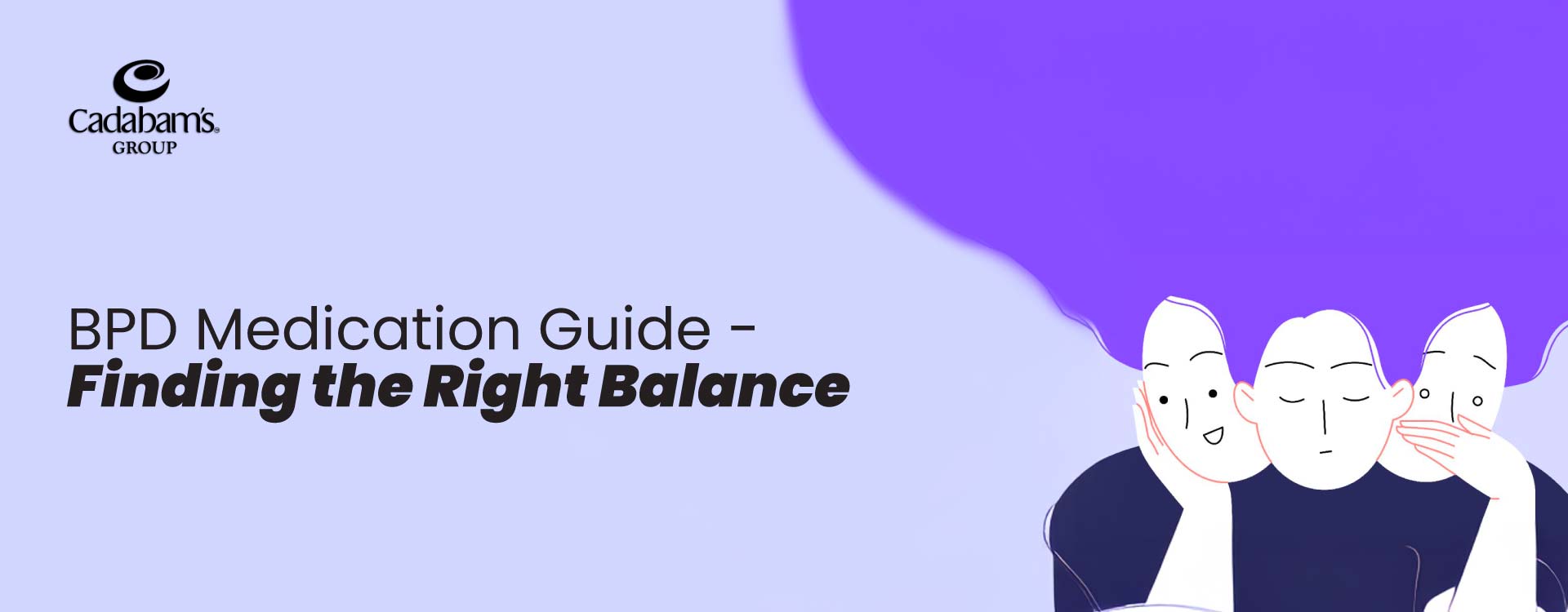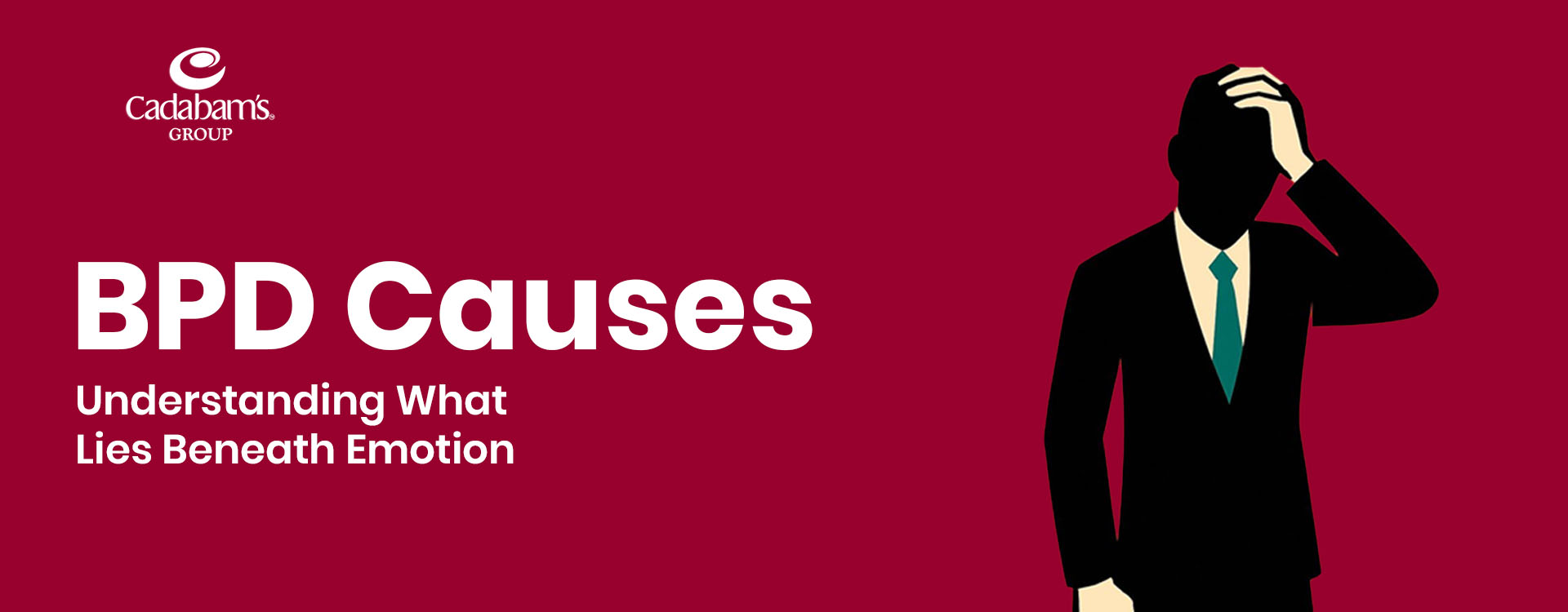People with Borderline personality disorder or BPD tends to, have a pattern of unstable relationships, be sensitive and impulsive. This may severely affect the individual along with people around them. The other people around them, most of the time, tend to find it hard to interact or maintain a relationship with these individuals.
Choosing the right medication for Borderline Personality Disorder (BPD) is crucial for managing this complex mental health issue. There are many options out there, and it's important to know the ins and outs of each one—what it does, possible side effects, and whether it matches your specific needs. This guide offers insights and options to help navigate the complexities of BPD treatment, aiming for optimal therapeutic outcomes.
The Benefits of Medication for Borderline Personality Disorder
There are several reasons why individuals might consider using medications for borderline personality disorder (BPD). It's crucial to collaborate with a healthcare provider to identify the most suitable medication based on one's specific symptoms and requirements.
Medications for BPD can:
- Alleviate symptom intensity: Medications can aid in managing various BPD symptoms, including mood fluctuations, irritability, depression, anxiety, and paranoia related to stress.
- Enhance daily functioning: By mitigating the severity of some symptoms, medications may also contribute to improved performance in relationship management and everyday activities.
- Prevent symptom escalation: Untreated BPD symptoms can intensify over time, so using medication to control these symptoms can be beneficial. Studies indicate that the frequency and intensity of BPD symptoms generally decrease as individuals get older.
- Address co-existing conditions: BPD frequently occurs alongside other disorders, which can complicate the diagnosis and treatment of BPD. Common co-occurring conditions include depression, anxiety disorders, eating disorders, substance abuse disorders, and bipolar disorder.
- Lower suicide risk: The risk of self-harm and suicide is higher in individuals with BPD. Medications that reduce the severity and frequency of symptoms can also diminish this risk.
- Enhance adherence to treatment: Beyond easing symptoms of BPD, certain medications can facilitate greater engagement in other treatment modalities for BPD, such as psychotherapy.
Types of Borderline Personality Disorder Medication
Although there is no dedicated medication for Borderline Personality Disorder (BPD), a range of medications can help alleviate its symptoms. Your healthcare professional will determine the most appropriate medication based on your unique symptoms and treatment goals.
Antipsychotics
Although BPD does not show symptoms of psychosis, antipsychotic drugs in lower doses are seen to be effective in the treatment of BPD. It is seen to be helpful in reducing symptoms such as hostility, anger and cognitive symptoms such as paranoia, suspiciousness, all or none thinking and dissociation. Drowsiness, headache, insomnia, discomfort and restlessness can be some of the side effects caused by this class of drugs.
Frequently used antipsychotics for BPD medication are-
- Abilify (aripiprazole)
- Geodon (ziprasidone)
- Risperdal (risperidone)
- Seroquel (quetiapine)
- Zyprexa (olanzapine)
Mood stabilizers
These medications play an important role in stabilizing brain chemicals that control behaviour and emotional temperament. Mood stabilizers are seen to reduce BPD symptoms like anger, hopelessness, impulsivity, low mood, mood swings and irritability. Dry mouth, constipation, drowsiness, reduced appetite and nausea are some of the side effects caused by this class of drugs.
Common mood stabilizers for BPD medication include:
- Depakote (valproate)
- Lamictal (lamotrigine)
- Lithobid (lithium)
- Tegretol or Carbatrol (carbamazepine)
Antidepressants
These medications are seen to reduce symptoms such as low mood, emotional instability, self harm behaviours and impulsivity. One of the common type under this class are selective serotonin reuptake inhibitors or SSRIs. They play an important role in altering the production of certain brain chemical affecting behaviour. Headaches, reduced appetite, insomnia, sexual dysfunction and sedation can be some of the side effects caused by this class of drugs.
Common antidepressants medication for BPD include:
- Effexor (venlafaxine)
- Nardil (phenelzine)
- Prozac (fluoxetine)
- Wellbutrin (bupropion)
- Zoloft (sertraline)
Anxiolytics
For those with Borderline Personality Disorder (BPD), intense anxiety episodes are common, lasting from hours to days. Anxiolytics, or anti-anxiety medications, are often prescribed to mitigate these intense anxiety spells by boosting GABA levels, which naturally calms the brain. Their effectiveness in BPD treatment remains underexplored due to a lack of comprehensive clinical trials.
Key anxiolytics prescribed for BPD include:
- Lorazepam (Ativan): Enhances GABA's effects for a soothing impact.
- Clonazepam (Klonopin): Specifically approved for panic disorder.
- Alprazolam (Xanax): Addresses anxiety and panic disorders.
- Diazepam (Valium): Used for managing anxiety, seizures, and symptoms of alcohol withdrawal.
Note that these medications are to be taken under the strict guidance of a psychiatrist after a detailed discussion on the individual’s symptoms and biological factors. Suddenly stopping these medications can trigger withdrawal symptoms, including mood changes, nausea, dizziness, fluctuations in blood pressure, accelerated heart rate, and risk of seizures.
Other Borderline Personality Disorder Medications
As research into BPD advances, new and innovative treatment options are being explored to offer relief and improvement for those affected by this challenging disorder. Below are some of the promising treatment avenues currently under investigation:
- Anti-dementia Drugs: Exploring benefits for BPD symptom management, focusing on cognitive and emotional regulation.
- Anesthetics: Studied for their potential in mood stabilization and pain perception in BPD treatment.
- Facial Paralysis Drugs: Under investigation for their impact on emotional expression and regulation in BPD.
- Omega-3 Fatty Acid Supplements: Early studies indicate a reduction in aggression and hostility, with further research needed for efficacy and safety confirmation.
Key Challenges in BPD Medication Management
- People have differing needs: The symptoms of BPD vary widely among individuals, requiring tailored treatment strategies.
- Co-occurring conditions are common: Concurrent mental health conditions can complicate the choice of medication, such as the risk of antidepressants inducing manic episodes in those with bipolar disorder.
- Multiple approaches may be necessary: Managing BPD often requires a combination of medications, psychotherapy, and self-care, with many patients needing several medications to address their range of symptoms.
Psychotherapy and Psychiatry for Effective BPD Treatment
There are other forms of treatments like psychotherapy; that has been seen to be effective in treating BPD. Psychotherapies are provided by psychologists and some of these are dialectical behaviour therapy, mentalisation-based therapy, schema focused therapy and transference focused psychotherapy.However, better and positive results are seen when both psychologists and psychiatrists work together in helping an individual with BPD. In this way physical issues associated to the illness are addressed by a psychiatrist as well as the emotional and behavioural issues are addressed by a psychologist.
Strategies for Coping with BPD
- Address Co-occurring Conditions: Managing additional mental health issues like substance abuse, anxiety, depression, bipolar disorder, and PTSD can significantly improve BPD management.
- Stress Management Techniques: Utilizing stress reduction methods such as deep breathing, exercise, visualization, and progressive muscle relaxation can mitigate BPD symptoms.
- Enhance Coping Skills: Developing strategies to handle emotional distress and impulsive actions, through mindfulness, social support, and dialectical behavior therapy, can lead to better daily functioning.
Towards a Brighter Future with BPD
Living with Borderline Personality Disorder (BPD) presents unique challenges, but with the right combination of treatments, individuals can lead fulfilling lives. Medications, while not a cure-all, play a crucial role in managing the symptoms of BPD, offering relief and stability for many. It's essential to remember that the effectiveness of medication varies from person to person, highlighting the importance of a personalized treatment plan developed in consultation with healthcare professionals. At Cadabams, we're committed to supporting your journey to wellness with tailored care. If you're facing BPD challenges, reach out to us at +919611194949. Together, we can create the path to a healthier, more stable life.
FAQs
What is the most effective medication for borderline personality disorder?
There isn't a "most effective" medication for BPD as treatment is highly individualized. However, mood stabilizers, antipsychotics, and antidepressants are commonly used to manage specific symptoms effectively.
How long does it take for BPD medications to work?
The response time can vary, but many individuals may start to notice improvements in their symptoms within a few weeks of starting medication.
Where can I find support for managing BPD?
Support can be found through mental health professionals, BPD support groups, and organizations dedicated to mental health awareness and treatment.
What medications should be avoided with BPD?
Medications to be cautious with or avoid in BPD include benzodiazepines due to the risk of dependency and worsening symptoms, and certain antidepressants if bipolar disorder co-exists, to prevent triggering manic episodes. Always consult a healthcare provider for personalized advice.
.webp)







